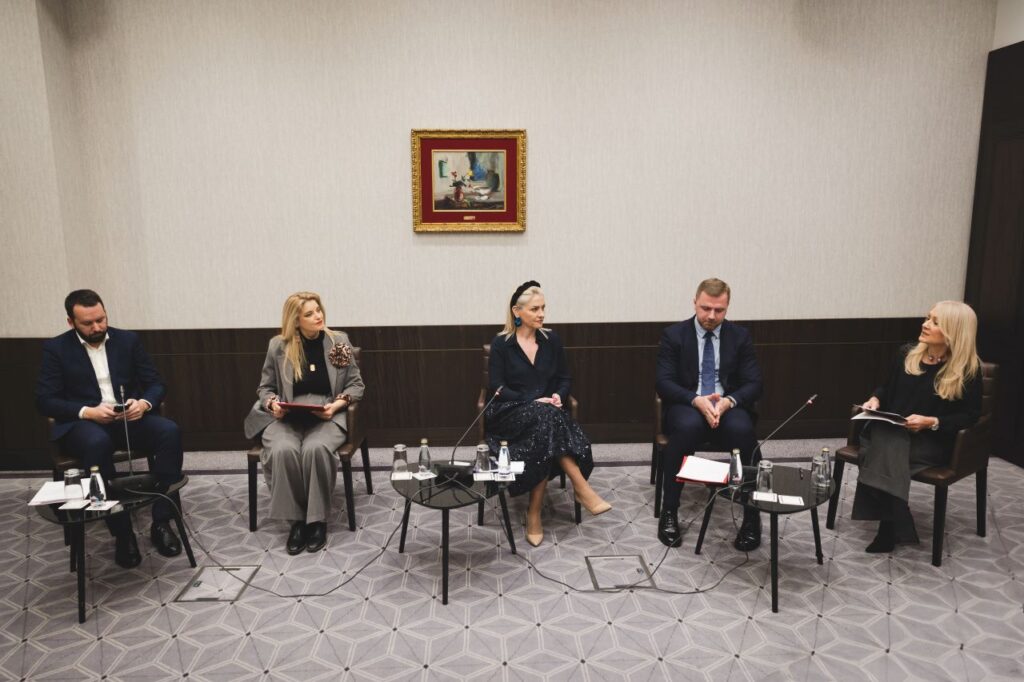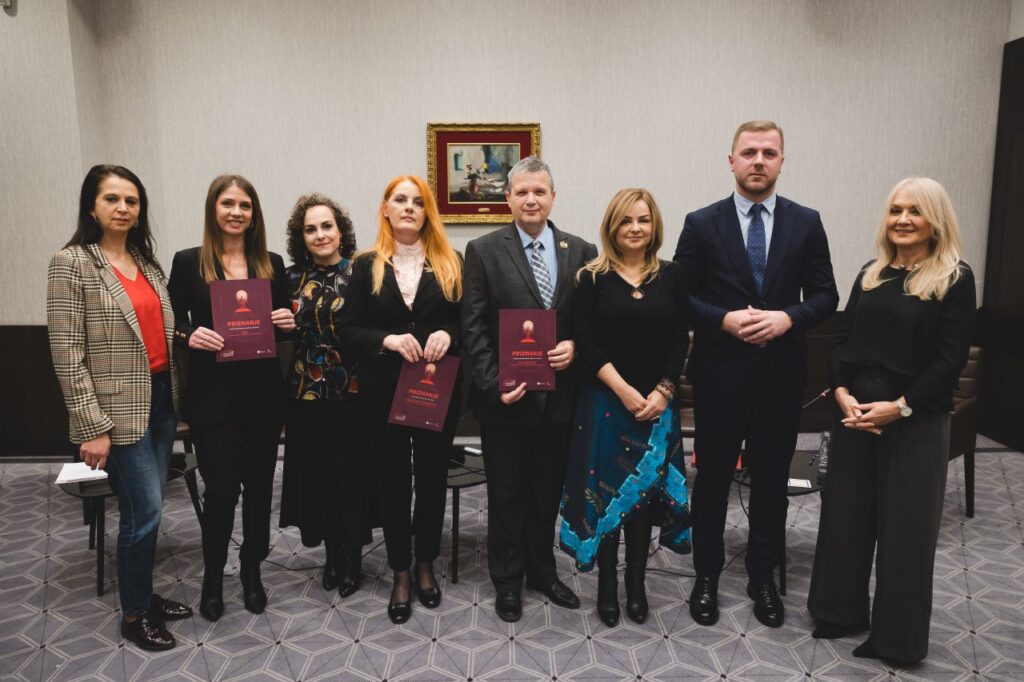“Local governments are the primary service providers for citizens, and while there is significant room for improving their transparency, some positive examples are emerging. Centralization remains a heavy burden for everyone,” was stated at the closing conference “Transparency for accountability,” organized today in Podgorica by the Centre for Civic Education (CCE) within the project “Transparent Institutions – Informed Citizens,” financially supported by the Ministry of Public Administration.
Naim Gjokaj, State Secretary at the Ministry of Public Administration, emphasized during the conference opening that full implementation of transparency and openness principles is a top priority for the Ministry. ” Ministry has conducted an Analysis of the functioning of the local self-government system, where we carefully examined the situation regarding the application of these principles. These are areas that require far more attention from decision-makers, and we remain focused on creating more efficient and sustainable legal solutions to improve the current state,” he stated. He also noted that a new Law on Local Self-Government is being developed, which should bring significant changes. “I firmly believe that when we act transparently and openly, everyone benefits. Citizens are informed and involved, and local governments gain partners among citizens, creating meaningful policies that address their issues and needs, thus fully achieving their purpose,” he concluded.
“Transparency is not merely a technical category but a fundamental prerequisite for building citizens’ trust in institutions. Transparency ensures accountability to the law, citizens, and, most importantly, to the public interest. Institutions that lack transparency struggle to fulfill their full capacity because public trust erodes. This is visibly evident in Montenegro, where institutions record a remarkable low level of public trust,” said Daliborka Uljarević, Executive director of CCE, in her introductory remarks. She further stressed that “participation is both a right and a responsibility for all of us, and without involving citizens in shaping public policies, no community can advance.”
The panel “The role of transparency in strengthening accountability from the perspective of institutions and civil society,” underscored the importance of using the freedom of information access mechanism, institutional openness, and citizen education.
“From the perspective of an independent body – the Agency for Protection of Personal Data and Free Access to Information (AZLP), I want to highlight the importance of proactivity among those obligated to apply the law, i.e., making information accessible to analysts, the public, and the NGO sector. This would ensure maximum transparency in processes and thereby state administration would be better aligned with the needs of citizens,” said Biljana Božić, Head of the Department for Free Access to Information at AZLP. She stressed the particular importance of timely action and informing the public. “In practice, information must be promptly shared with all users, as this results in better outcomes and greater trust in institutions,” explained Božić. “An informed citizen can provide quality suggestions to address challenges, while representatives of the authorities have the responsibility to lead processes transparently, inform the public in a timely manner, and present their results,” she concluded.
“Democracy and transparency are interdependent. There is no transparency without democracy, and there is no democracy without transparency,” said Damir Suljević, Human Rights Programme Coordinator at CCE. He believes that the key shortcomings in the application of the Law on Free Access to Information have been clearly identified. “It is already clear what the problems are in practice, which is why it is important to address the root causes, not just through amendments or the adoption of a new law but also through other measures that the authorities must undertake to raise awareness of the importance of transparent work,” he stated.
Miodrag Vujović, General Secretary of the NGO KOD, noted a misunderstanding regarding the need for information availability. “If we cannot find information on official websites, we must submit requests for free access to information. However, as we hear from AZLP, some individuals abuse this mechanism, casting a shadow on those of us using it for investigative work as a corrective factor in the system. The actions of those who abuse information can affect the perception of those of us who use it responsibly and professionally,” he said, pointing out that some bodies are closing themselves off to critics, though there are also good examples. He also emphasized the need for education on how to properly use the Law on Free Access to Information and the practical challenges such as long waiting times for information and incomplete data availability, which can lead to lawsuits in the Administrative Court and lengthy processes where information becomes outdated by the time it is obtained. “The law is clear, but the reality is different. The system of accountability in Montenegro is at a low level because if we don’t have mechanisms to sanction those responsible for making information available, we cannot expect progress,” he warned.
The second panel presented the Transparency Index of Municipalities in Montenegro, followed by a discussion on best practices and challenges at the local level, with a focus on centralization, which represents a major burden for municipalities.
Zvezdana Kovač, Strategy and Outreach Director at CCE, explained the methodology for developing the Transparency Index of Municipalities in Montenegro and some of the challenges researchers faced. “It often happened that researchers could not find the required data or document on the municipality’s website and had to search for the same document using variations of the title and date,” said Kovač. “One of the key recommendations for all municipalities would be to make their websites more accessible and user-friendly to the public. Just because data is published does not mean it will reach the end user. There were multiple barriers that prevented researchers from accessing the requested data simply because someone failed to write a clear title and place it in the correct section of the website or forgot to do so altogether. The end user of the information, the citizen, often encounters missing data and documents,” she noted.
Blaženka Dabanović, Deputy Secretary General for Local Self-Government System at the Union of Municipalities of Montenegro, addressed challenges and opportunities for improving local government operations in transparency and access to information. “When looking at the websites of local self-government units, it often appears that information is available, but not systematically organized. Information should be categorized and published in the same way across all municipalities to ensure its accessibility to citizens,” said Dabanović. She supported the initiative to establish a systematized register of local community services. “Such a platform would be crucial for improving transparency and access to information, reducing centralization, and enabling a more balanced distribution of resources and services between developed and less-developed municipalities,” she concluded.
Naim Gjokaj noted that the Ministry of Public Administration’s analysis showed that Montenegro has one of the most centralized administrative systems. “We have started the decentralization process, which is an important step. A centralized system means that local governments do not have the power they should have,” he assessed, emphasizing that public administration reform remains a priority in the coming period. He also expressed support for CCE’s initiative to establish a unified catalog of services. “Digitalization is the foundation for improving governance, and one of the key steps is the establishment of a systematized register of local community services,” he concluded.
“I have worked both at the local and national levels, and I can notice the differences. I am glad to hear the State Secretary mention the system is centralized because we often face the need to consult national authorities for decisions at the municipal level,” said Nihad Canović, Mayor of Plav. He highlighted the importance of transparency in several key areas, such as budget spending, public procurement, and local hiring processes. “Every job vacancy must be advertised through the Employment Agency, ensuring equal opportunities for all candidates. My goal as Mayor is to ensure that budget spending, public procurement, and hiring are completely transparent processes. These are key elements for building trust and fighting corruption,” he stated.
Aleksandra Dapčević, Secretary of the Secretariat for Local Self-Government and Social Affairs of the Municipality of Cetinje, discussed the importance of collaboration between local governments and the civil sector in the decision-making process. “In the Municipality of Cetinje, we use the ‘free seat’ institute, which allows the participation of NGO representatives in almost all council meetings,” said Dapčević, emphasizing that the municipality has successfully implemented the Council for Cooperation between Local Government and the Civil Sector, a platform for continuous exchange of information and ideas, which contributes to strengthening transparency and public trust in local government operations. Dapčević also presented plans to introduce an e-Participation system at the beginning of the next year as part of the municipality’s efforts to modernize and digitalize public services.
After the panel, awards were given to local governments with the highest scores in the Transparency Index of Municipalities in Montenegro. The Capital city of Podgorica took first place, followed by the municipality of Herceg Novi in second, and the municipality of Bar in third. Representatives of these municipalities received recognition for their efforts in this area.
The event gathered representatives from local governments, institutions, and civil society, who constructively discussed important issues related to key elements of democratic societal development, with openness and accessibility of information at its core.
Nikola Đurašević, Programme associate




